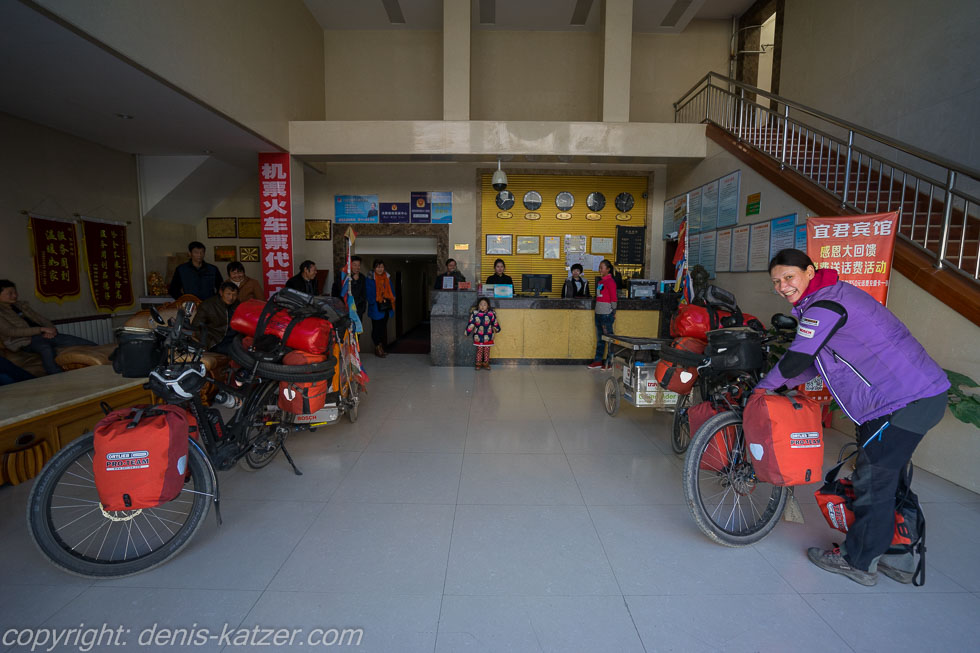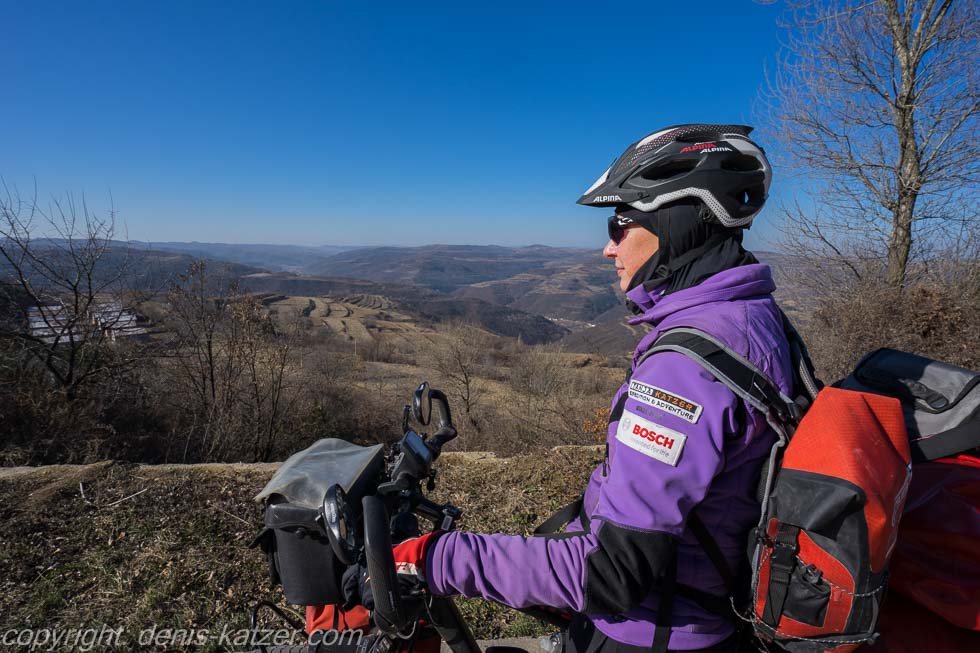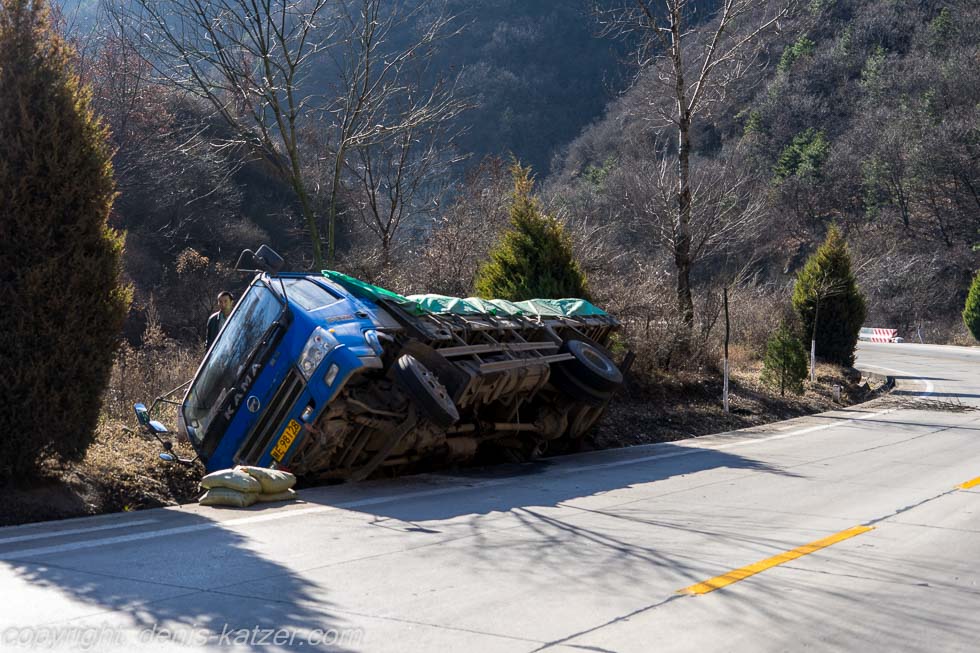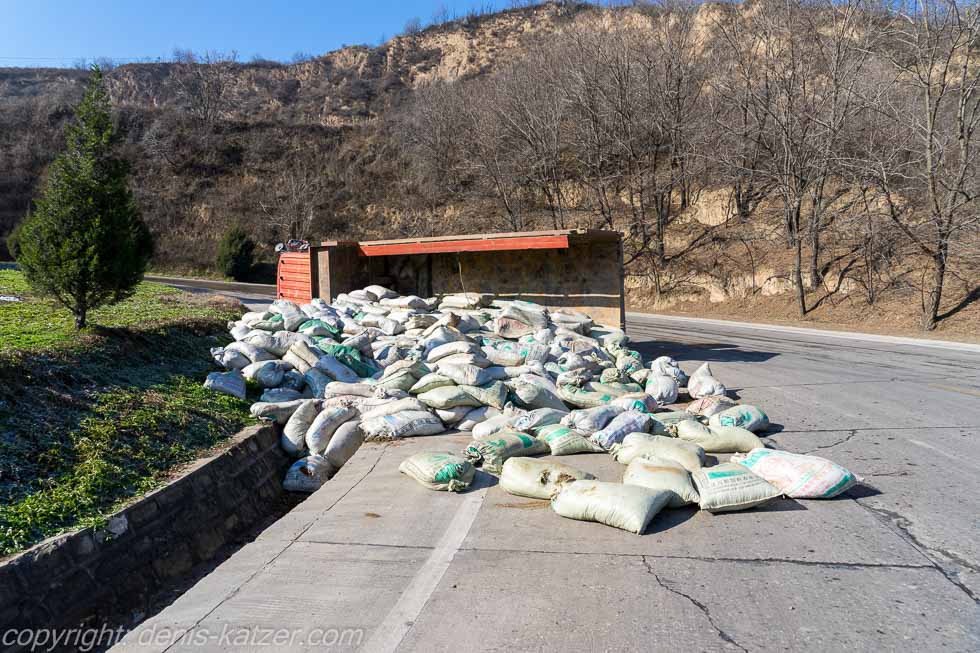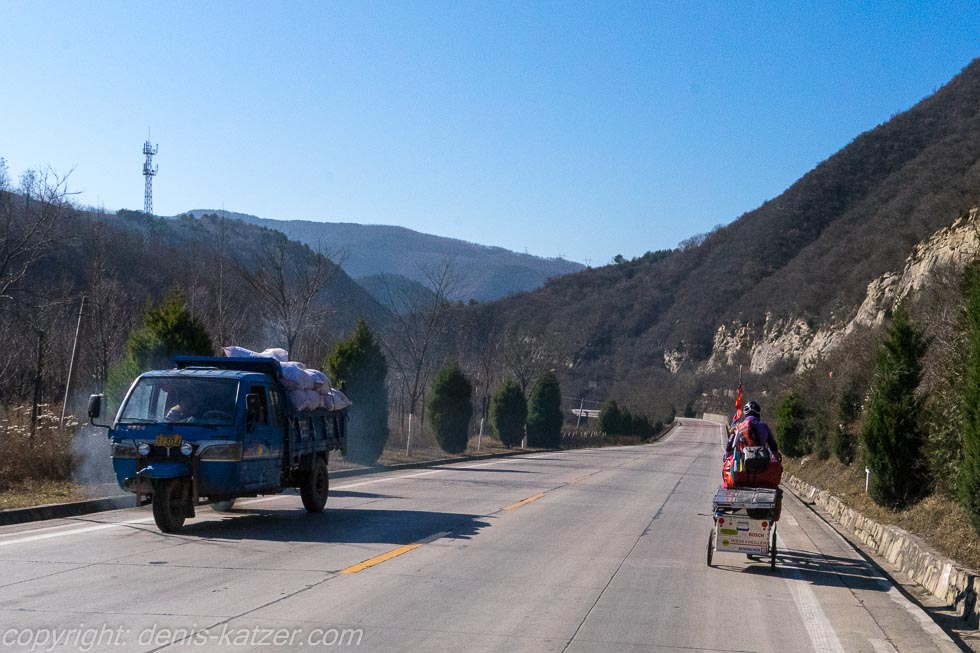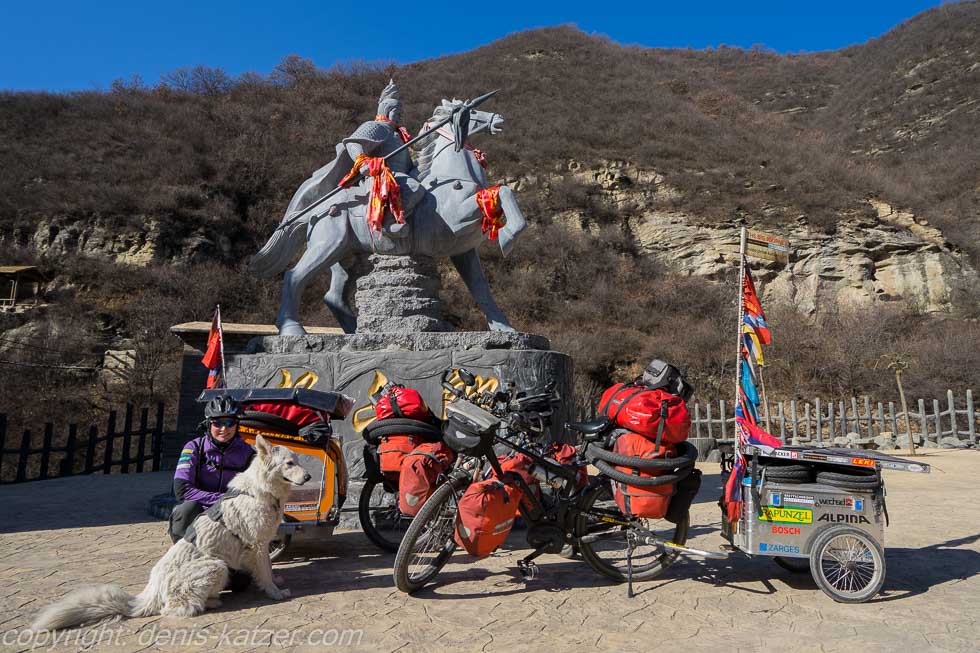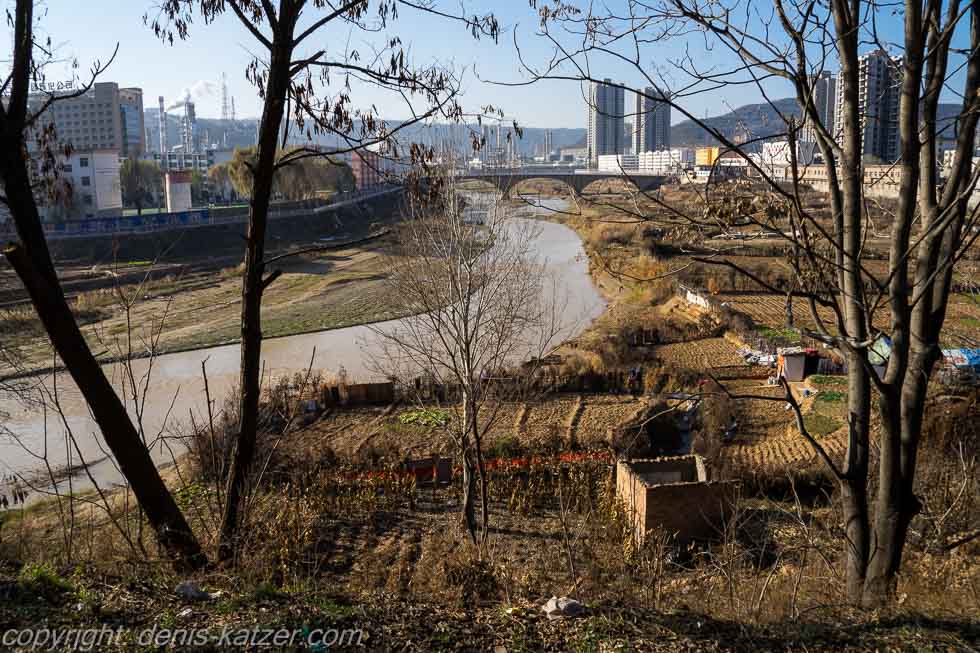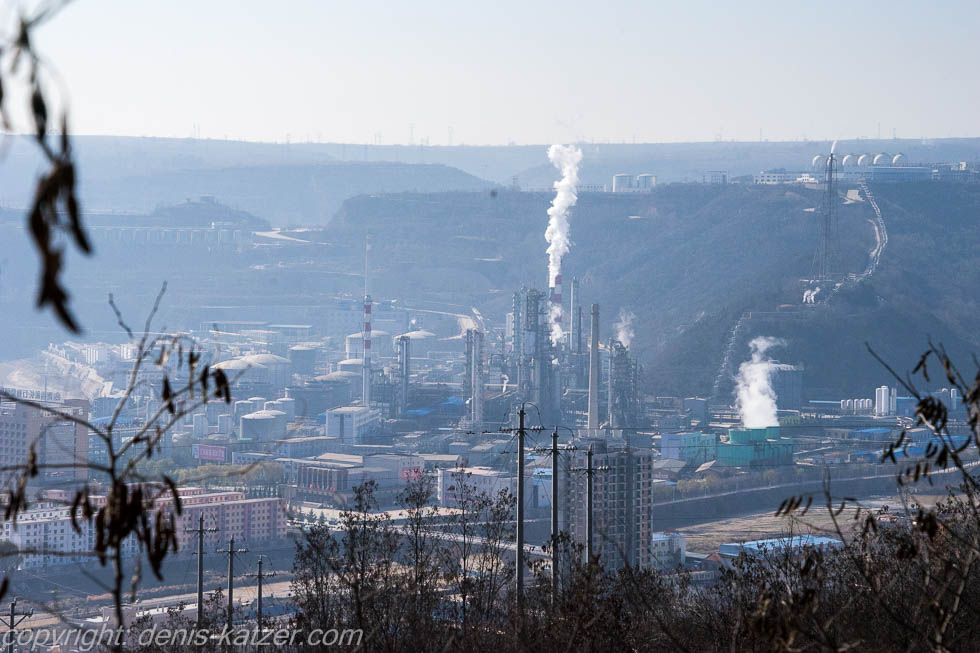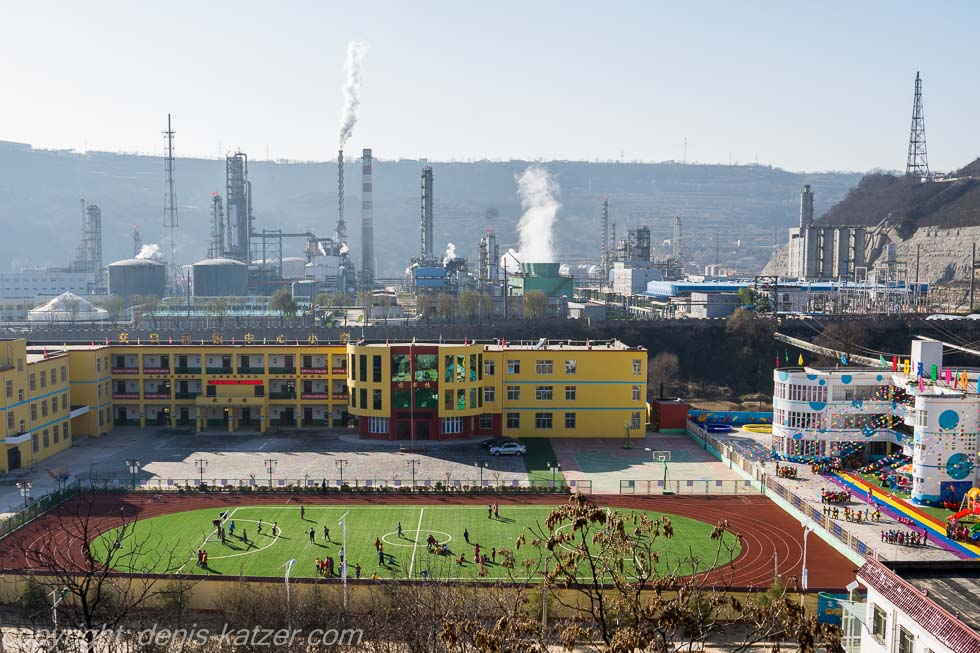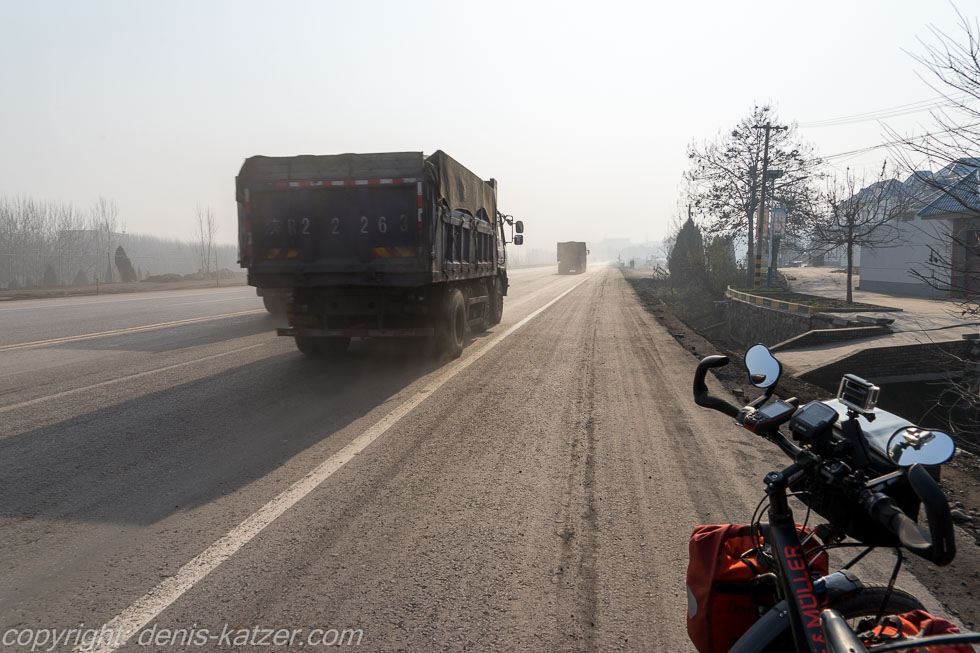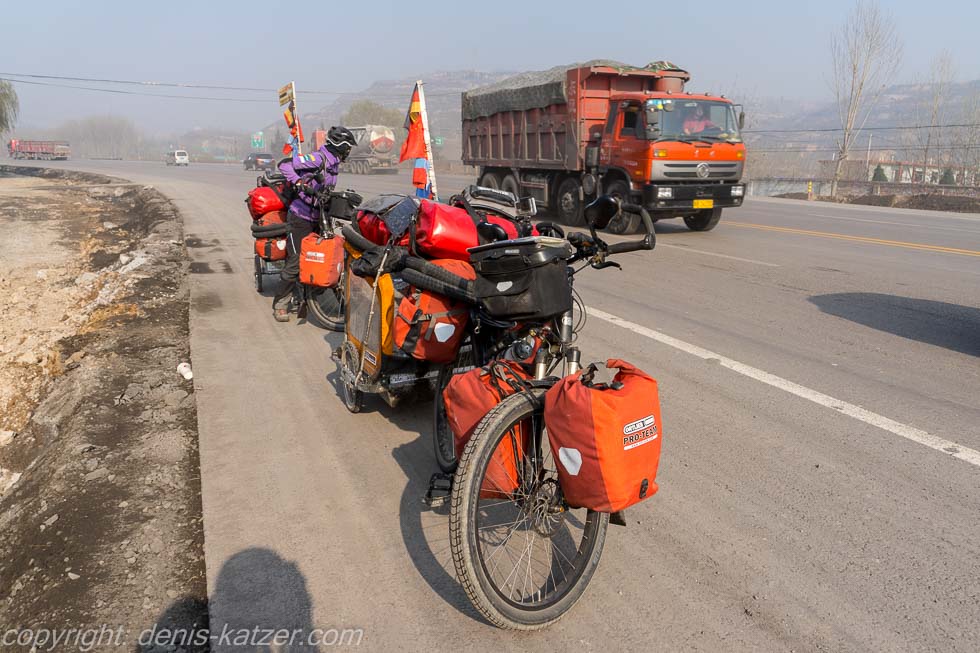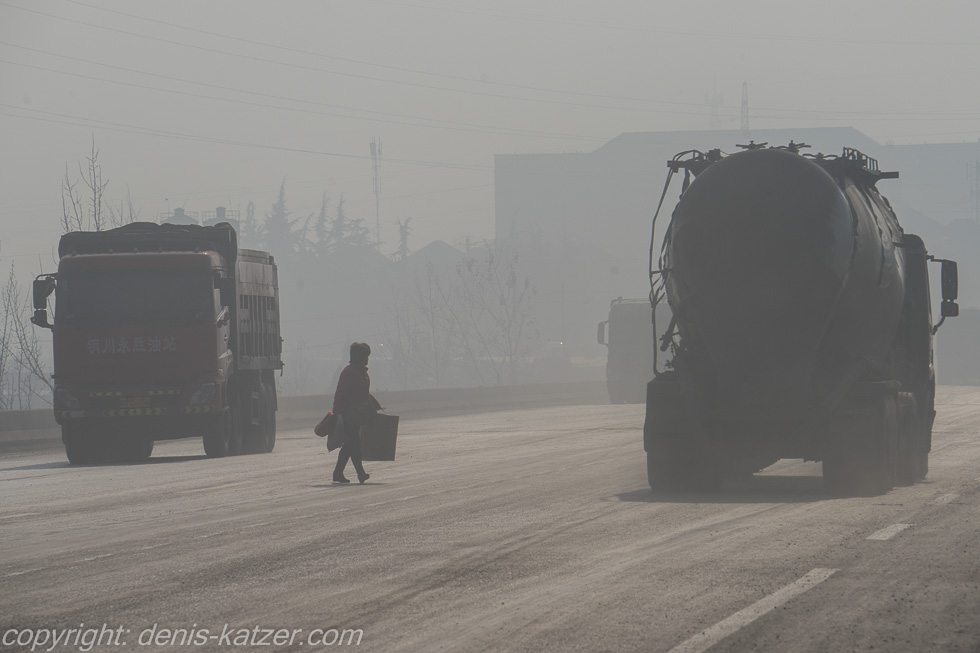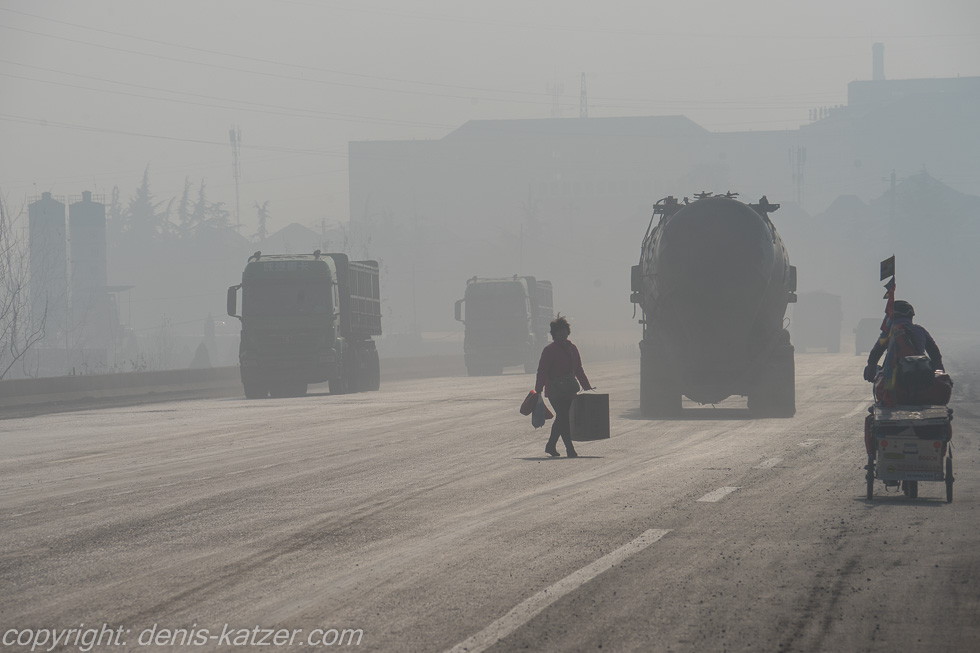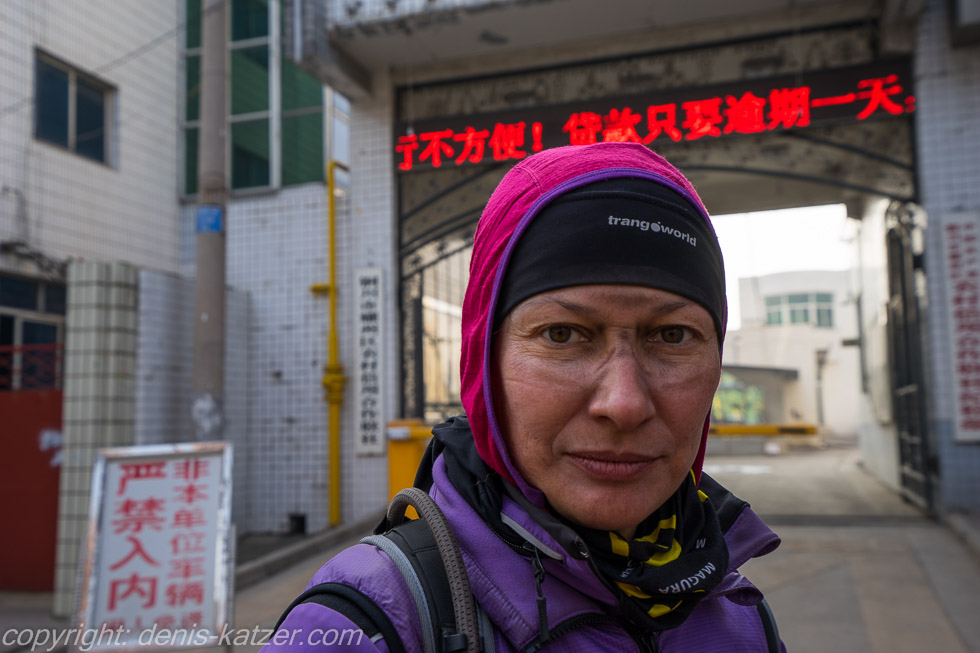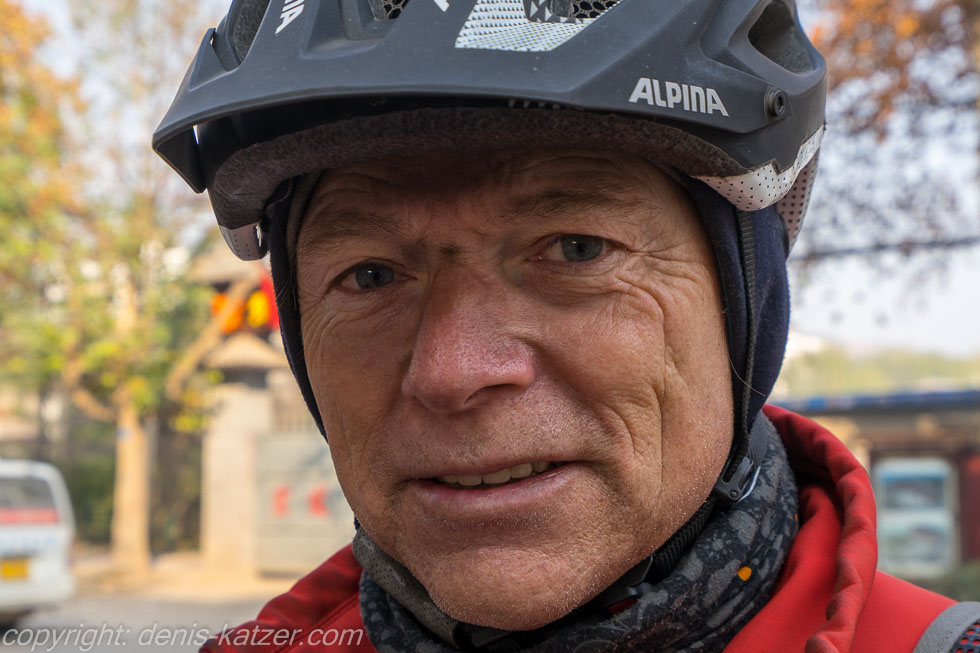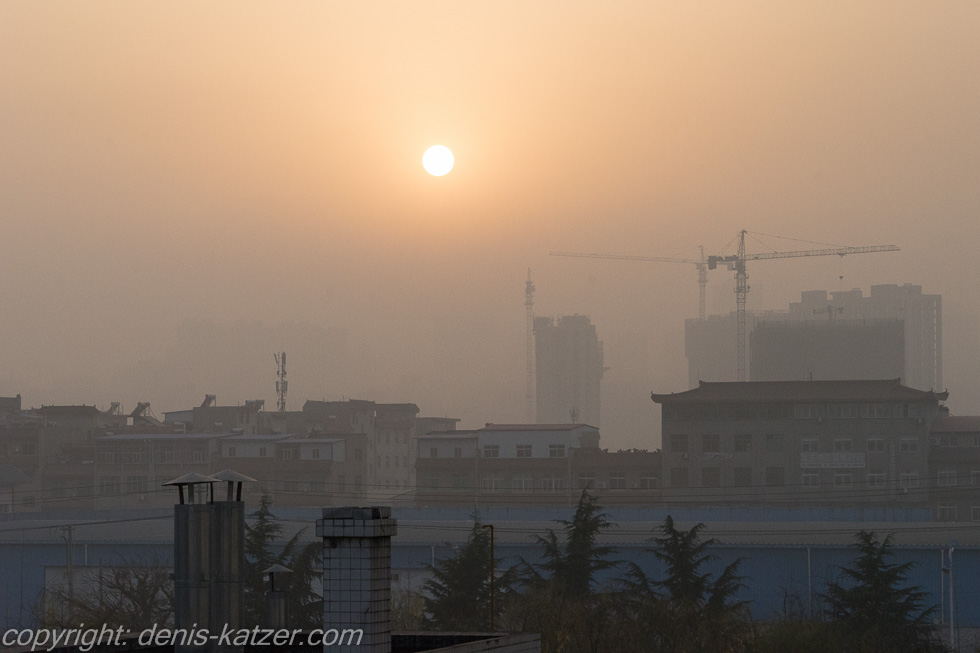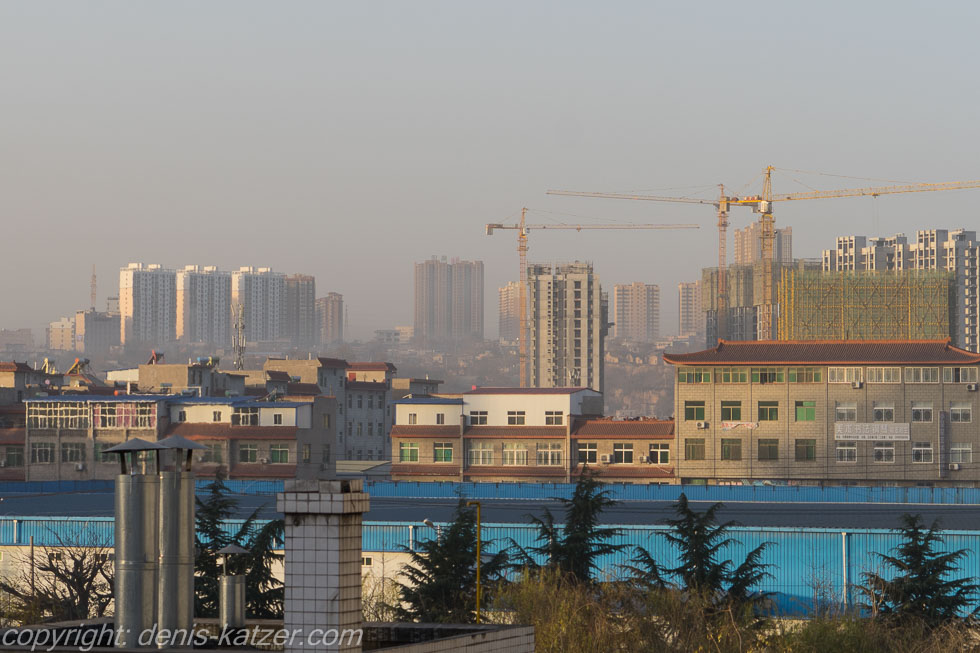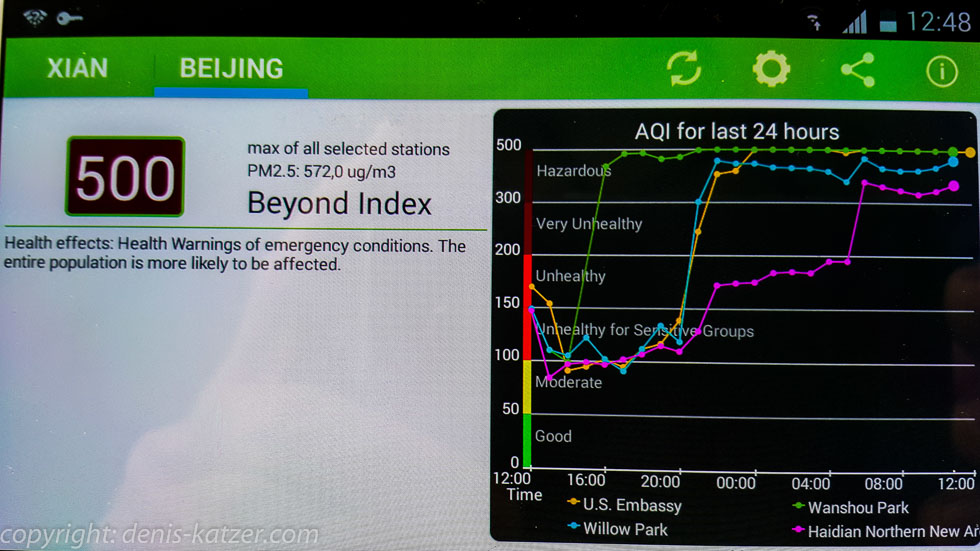
Life-threatening smog
N 34°55'15.4'' E 108°58'34.7''
Date:
29.11.2015 until 05.12.2015
Day: 154 – 160
Country:
China
Province:
Shaanxi
Location:
Tongchuan
Latitude N:
34°55’15.4”
Longitude E:
108°58’34.7”
Daily kilometers:
69 km
Total kilometers:
11,301 km
As the crow flies:
54.40 km
Average speed:
24.1 km
Maximum speed:
50.4 km
Travel time:
2:51 hrs.
Soil condition:
Asphalt part very bad
Maximum height:
1.600 m
Total altitude meters:
13.298 m
Altitude meters for the day:
400 m
Maximum depth:
658 m
Sunrise:
07:30 am to 07:35 am
Sunset:
5:33 pm to 5:32 pm
Temperature day max:
5°C to 12°C
Temperature day min:
minus 1 °C
Departure:
10:00 a.m.
Arrival time:
2:30 pm
(Photos of the diary entry can be found at the end of the text).
The roar of an unleashed predator roars at us. At least that’s what it sounds like in the dark tunnel as a truck roars towards us. Spit out of the black tube, we enjoy the sunny day and the mountain air of the Qin Ling Mountains, whose unconventional plateau road has been carrying us through a breathtaking landscape for days now. At an altitude of 1,600 meters, the pass road slopes slightly downwards without rising again on this day. Fortunately, because I don’t feel particularly fit due to a cold. It goes deeper and deeper for hours. Our brakes are running hot. For some trucks, the gradient is sometimes fatal. Two of them were overturned with their entire cargo. The load is scattered across the road. Although the accident must have happened only a few minutes ago in both cases, there is no sign of the drivers. We continue our exhilarating descent. A little later, a Chinese long-distance cyclist leans against a tree smoking a cigarette to rest. “Ni hao!” we greet him. Because he has already covered a lot of uphill kilometers today, he is obviously not in a position to answer. Then the first power stations appear. Their exhaust gases pollute the clean mountain air and the waste water pollutes the nearby river. A school, kindergarten and sports field have been built at the foot of one of the power plants. As we drive past, the green artificial turf of the facility is populated by youngsters and children. The picture is bizarre, because while the Chinese offspring are having fun, they are simultaneously covered in toxic smoke and steam rising from numerous chimneys.
After perhaps 27 kilometers, we reach a wide valley and cross the G65 freeway. Just a few hundred meters further on, our mountain road joins the S305 trunk road. From now on at the latest, the peace and quiet of the past few days is over. As if someone had been digging around in an anthill with a stick, things start to swarm around us. If we thought we had finally escaped the heavy truck traffic, we suddenly find ourselves in the middle of it again. Down here in the valley, nothing remains of the clear mountain air. On the contrary, we have the feeling of being swallowed up by a wall of grayish-yellow fog. Except that it’s not fog but clearly heavy smog. The completely dirty road is suddenly soaking wet that the dirt thrown up by the tires flies around our ears. The reason is the countless trucks, hundreds of which are jammed in front of a police checkpoint after the mountain drive. Each of the steel giants is weighed here. Drivers will probably have to pay road tolls depending on the load. One reason why they drain all the water they use to cool their brakes in the mountains. The result is an excessively slippery and slippery road surface. With extreme caution not to fall, we pedal our bikes through the mud, over the heavy cracks and deep potholes that open up on this stretch. Right next to us, the engines of heavy construction machinery roar as they pull a new, even wider strip of asphalt through the sad valley. China currently has
The United States of America has approximately 3.86 million kilometers of road, compared to 6.51 million kilometers in the United States and 644,480 kilometers in Germany. Many of China’s roads are still in a poor condition, but are getting better every day thanks to massive construction measures. In 2006 alone, 4325 kilometers of freeways and no less than 93,720 kilometers of trunk roads were built across the country. The workers toiling in the haze next to us wear no masks and inhale the black tar vapor and the smog enveloping them directly into their lungs. There is no labor protection because the individual is of little value in the mass of supplies. In total, around 263 million migrant workers move through the country, who have only limited access to the urban social system and urban civil rights. However, with their sometimes life-threatening jobs, they earn 2290 yuan (€322) a month, which is more than the average salary of a young professional with a university degree, which is only 2000 yuan (€282).
Our journey, which was pleasant just a few kilometers ago, ends in a horror scenario. The haze around us gets thicker and thicker, combining with the swirling dust, the smoke, the heavy fumes from the tar, the power stations and the exhaust fumes from the trucks. The broken asphalt beneath us changes from dry as straw to muddy wet. The swirling mud sticks to our saddlebags and soon falls back to the ground as a desert-dry crust. Actually, it’s absolute madness to be out and about on a bike here. We’re finding it harder to breathe by the minute and I feel like my lungs are already rattling. Or is it just my imagination? I can only hope. Suddenly, an unpleasant twinge goes through my stomach. “Oh, what’s that?” I whisper. Then the pain is gone again. As if he had never been there. Is it from the smog? Impossible, it doesn’t give you a stomach ache, I reassure myself. “Ouuhh!”, an even more violent tugging than before elicits an exclamation from me until this also passes again. After the fourth or fifth cramp, I’m visibly nervous and another ten minutes later I realize that something is about to happen. We are just passing one of the endlessly long construction sites when it hits me again. It hits me in the gut like an arrow. Thank God there is a deep ditch next to us at this moment. I pull the brakes, jump off the bike and shout: “Toilet paper!” Tanja comes to a halt next to me. “What?” “Do we have any toilet paper to hand? Quick, otherwise there’ll be a disaster,” I say. Seconds later Tanja hands me the roll, which I grab like a relay runner and dash into the ditch. A while later, I climb out of the hollow again. “So, better?” asks Tanja. “Much better. I think there was glutamate in my dinner,” I say, looking at the smog-covered street and not feeling the slightest desire to plunge back into the traffic madness. “Let’s go,” I decide, because we have no other choice. Back in the madness of roaring traffic and air that is no longer air, we approach the city of Tongchuan with its 840,000 inhabitants. The closer we get, the more vehicles use the asphalt and the worse the air gets. We have never experienced anything like this on our travels. People appear out of nowhere and cross the road. A grandfather stands at the side of the road. He holds his two-year-old grandson in his arms and watches the traffic. Poor child, it goes through my mind. As far as the eye can see, there is only this dirty fog. The low peaks of the nearby mountains are also enveloped by the yellowish gray wall and can only be seen as a diffuse mass. What is happening to this country? What a crime against the population. It occurs to me that countries that sustainably pollute and destroy their rivers, lakes and forests are destitute despite their industrial prosperity. What kind of swap? Prosperity against the destruction of natural resources. Prosperity against the destruction of the future. Prosperity at the expense of the future generation, at the expense of our children. According to a study by the US elite university Berkely, more than 4,000 people die every day in China as a result of heavy air pollution. That is 17 percent of all deaths in the entire country that fall victim to polluted breathing air. According to the China Human Development Report, China was already at a crossroads in 2002, where the social and economic progress it had achieved was being destroyed again by the immense environmental destruction. The health-threatening PM 2.5 particulate matter measured in Beijing has reached a record level of almost 600 micrograms per cubic meter these days. The media around the world are reporting on this, which is why we are also hearing the news. Considering that, according to the World Health Organization (WHO), an average limit of 25 micrograms should not be exceeded throughout the day, 600 micrograms is beyond my comprehension. I actually thought that this terrible air pollution only applied to China, but unfortunately I was wrong. This man-made disaster is slowly spreading around the world. New Delhi, for example, is said to have the dirtiest air in the world. The government wants to save itself with driving bans. I just wonder if New Delhi’s air is even worse than Beijing’s, what else do people actually breathe? Even many Italian cities are currently suffering from high levels of air pollution, so much so that the mayor of Naples even wants to ban pizza baking in wood-fired ovens – and that’s no joke.
Tüüühhht! Tüüühhht! Tüüühhht!, the noise around us is incessant. My body feels completely shattered. I’ve been coughing for some time, my lungs are burning from the effects of around 400 micrograms of particulate matter per cubic meter, which raises the question of whether we should stop this nightmare here at this point to protect our health. Or will it be better further south? Will the air get better when winter is over? Sure, but it will be a good three months before then. Perhaps we should retreat to a hotel during such smoggy days? That would relieve the pressure on our lungs. We will see what strategies we develop in the coming days. At the moment I can hardly think straight because of the cold, the rumbling stomach, the exertion and the headache caused by the bad air. I need rest and am glad that Tanja is feeling better at this point.
We drift along in the urban traffic flow. Because we have not reached Margaret in the last few days, we do not have a pre-booked hotel for this city. Only the thought that we are constantly being sent away because of Ajaci, no foreigners in Linz and the bikes makes me feel even more powerless. Standing at a crossroads, I think about which direction we should take. “Listen to your gut,” says Tanja, who is standing right behind me and obviously knows what I’m thinking about. Because it seems easier, I continue straight ahead. Not good, it goes through my head, whereupon we turn around and, as my gut whispered to me, turn right. Just 20 meters past the crossroads, I discover a simple hotel. “You ask first,” I ask Tanja. “Okay,” she agrees, puts her bike on the stand and goes into the hotel. Just five minutes later, she comes outside with her thumb up. “We’re allowed in, the bikes get a place under the stairs and Ajaci is accepted,” I hear with relief.
I am plagued by diarrhea all night. The next morning I feel weak and exhausted and suffer from a severe sore throat. We decide to rest for a day. The next day, I catch a nasty cold and lie in bed for six days without being able to lift a finger. As we had planned to take a week or two in the big city of Xi’an ahead of us to see the Terracotta Army, write texts and, above all, relax in a nice guest house, I am a little frustrated about the unforeseen stop. However, the hotel, the pleasantly warm room, the reasonable price of 120 yuan, (16.86 €) the courteous staff turned out to be a good place to recover.
Tanja is out with Ajaci when I decide to take a shower. I feel a little better and want to take the opportunity to wash away the rest of my cold with the wonderfully hot water. Suddenly there is a heavy knock on the door. “This can’t be true,” I grumble and decide not to interrupt my shower. The knocking increases more and more, but I continue to ignore it. If it’s the police checking our passports, they can come back later. 20 minutes later I crawl back into bed. Suddenly there is another knock. I slip into a woolen sweater and open the door. It is the manager of the hotel who kindly asks me to change rooms. “Why?” I ask in surprise, not feeling able to move. “The shower is leaking and flooding the lower floor,” I understand…
The live coverage is supported by the companies Gesat GmbH: www.gesat.com and roda computer GmbH www.roda-computer.com The satellite telephone Explorer 300 from Gesat and the rugged notebook Pegasus RP9 from Roda are the pillars of the transmission.
